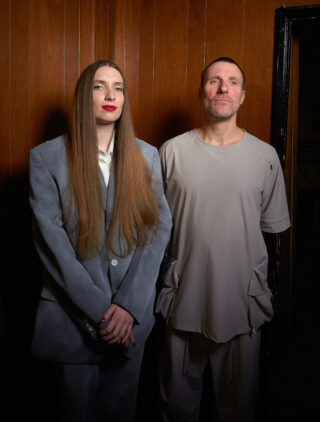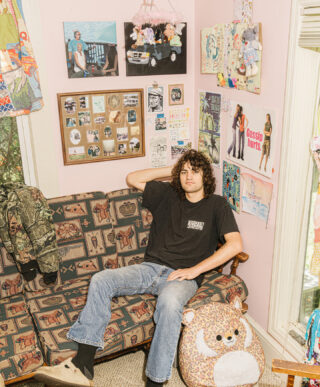Over the weekend the United States experienced a civil eruption as Donald Trump stiff-armed his immigrant ban into place. As the mounting distress diffused throughout the globe it ignited protests in more than 35 major cities. In order to fully render the scope of such a divisive policy, many artists, entrepreneurs, athletes, and individuals have been sharing their stories. One artist, the Iranian sound-futurist Ash Koosha, has experienced exile from more than one place and released a statement on Monday denouncing the ban. Speaking in reaction to the news, Ash spoke to us at length about the growing class divide in America, a festering wound that a certain concrete-quiff megalomaniac has taken full advantage of, as well as similarities to his home country of Iran, the difficulties of touring and a potential solution to physical barriers.
L&Q: Ash, what’s been your reaction to what’s been happening?
It’s been hectic… just a sudden shock, but I’ve also been trying to tell people it’s not something new. I mean last year when I wanted to play FORM and do the rest of the tour in America I had a lot of the same problems. This whole restriction on going to America was still happening in Obama’s time, and this is kind of an extreme version of it. And not because I’m not affected by it, but the very fact that I’m in the same category as the conservative MP of Stratford, a Brexit supporter. That shows we’re in a really fucked up situation. It’s about the segregation of people who actually fear someone like me.
You want to address the fear of “the other”?
Exactly. So now those people who are afraid of the alien, they can hear these stories. People like me, who have been restricted in their own country, now we’re being restricted going to your country. Now they can understand at a level where human beings are actually involved.
What’s been your experience with the US, and how discrimination has made it difficult to be an artist?
So last year, the first time I’m going to America, we have to apply way ahead of time for the O-1B artist petition. They said, due to the nature of my nationality they need to do extra administrative processing, which caused the cancellation of my tour, and a lot of money spent. It was stressful. I had to cancel a film, a documentary/drama that I was shooting during the tour, all that money was gone. When I get to America, first impression is: I get to LAX, the officer asks me one question: “You’re Iranian, how did you get this visa?!” I’m thinking what does that mean? I applied for it. He was like, “are you famous?” I mean, I don’t know, Google me.
This year, everyone was hopeful that I would be able to make up for last year’s cancelled tour. But my agency is just like, ‘sorry bro’. They can’t risk it. They can’t book 10, 12 shows just to have a law change on them in April. And this will have a big impact on me promoting my work in America, which is the biggest market right now, no question. And all this being said, I was planning on moving to LA, so… that is cancelled now.
With all of this frustration, and I’m used to it, I’m flexible. We’ll figure it out. But we have to figure this out, and prevent something bigger, a bigger chaos, from coming. This is the peak, I mean this is it. This is where we have to start worrying about Nazi Germany happening again.
Was the backlash and censorship you faced at home an environment you were born into?
Yeah, post-revolution. Actually when I was born it was more… it was in the middle of the war. I grew up in Germany until I was 6. So when we went back to Iran, VHS was banned, you couldn’t have satellites. There are still restrictions. They’ve executed people who created porn. Straight up – you make a porno and then you die. I still believe no one is supposed to die for making a porn film. And…this guy? Love. Gaspar Noé. He would be executed there. No question.
I grew up in that kind of environment, and we all said, okay, let’s all forget about it. We can’t go back so we’re not gonna waste time seeing what happens to this [post-revolution] regime, we’re gonna get the fuck and do what we want to do.
But the people who support Trump’s actions, they don’t care about that. They just care about being safe in their small towns or states, without even knowing about what Iran has been going through. It’s a huge problem and a class of politics has been capitalizing on that. And we’ve been using the wrong approach. I think the right approach is to inform the people about the details, not mocking them. What I’ve never liked is the American comedy that shows Trump supporters as subject to comedy, making fools of them. John Oliver, Trevor Noah. Who are you making fun of? Not Trump, but working class people who work their asses off.
What do we need to say to the American people in order to begin to bridge an understanding?
I think the first point is to show the whole idea that nationality can have anything to do with disrupting the social course of American people or their livelihood is absolutely false. The whole problem [of terrorism] in the Middle East is allied political groups from all over the Middle East. They’re allied as militant terrorists from many countries that are not on this list. The conflict is not in Iran. It’s not even in Iraq. The group named ISIS in Syria is an alien group. You can’t generalize, say a doctor or a Google exec. How did we come to put people in one box? We need to talk about the fear, directly to the people.
I think the opposition in America is too symbolic. It lacks substance and action. They lack simplification of ideology. We have a liberal system that’s also fully capitalist, fully in favour of banks, and destructive to the economy. Of course there’s no trust in it. I don’t trust it.
There’s a sense that the left sort of “won” the culture wars that are ongoing in the US. And we kind of fetishise facts and metrics and numbers now, like they’re the source of all understanding.
Exactly, but I want to point out that, in music, people don’t sing about political issues anymore. There’s no Radiohead. No one sings about ISIS. This is the child of neoliberal thinking – where I’m good looking, I’m on Instagram, everything’s fine, Oh! But also, inequality is important, I care about things, black lives matter, this and that. We feed ourselves out of these nice compassionate works, but it goes nowhere. It’s a surface level contribution that makes us think we are progressive and leftist and so on.
Other people, who are economically suffering, they’re not following. They’re not included in anything. I’m more worried about that than I am about my visa getting cancelled at this point. That will get figured out. We’re creating a big number of people who are upset. We laugh at them, like they don’t understand, “Oh, they’re like, uneducated!” We see them as animals. Of course they’re going to forcibly elect someone like Donald Trump. I didn’t expect anything else. I was keeping my theories to myself, but now I’m involved. Who knows, it may be reflected in my music or my movies, but first it needs to be discussed, this separation, and the economic distress that has caused this separation.
The type of world Trump sees is the antithesis of what you’ve been able to achieve across the globe. Do you think your music serves a growing global audience?
My music serves ideas. My music is a projection of many ideas that come with it, which is to say: designing sound in a space, virtual reality, the new world we live in, augmentation, all of these ideas that will lead to the future. I’m not only playing with samples to enjoy myself, I’ve always thought beyond the form and aesthetics. It’s important that we share that with people.
I think there is a large group of progressive people that are looking forward to a more global cultural network.
The way we consume and share, we experience, we express, it’s irrelevant what sort of social container that people are inside, or that they want to box themselves in. If you don’t want to use it, fine. But you have to be able to share. You have to be able to have no boundaries so you can make boundaries for yourself. This is what America has now taken away from the world…from a world that has accepted, almost, that not quite economically, or politically, but culturally, let’s just loosen up and share things.
Thanks for sharing your perspective on this. What’s planned next for you?
I’m working with Ninja Tune on my next record. It’s going to have a different direction in terms of sound. I’m exploring new things with vocals, and I think I want to include more this concept of the Actual World, and the distorted Actuality of the World. I’m quite busy making different projects. But at this point, in the last couple of days, I’m thinking I might have a different direction this year, trying to inform people about what we’re standing for. We all want the same thing, which is progress and survival, and to contribute.
Your manager mentioned in his article for Dazed you have a “genius” solution worked out for your lack of visa. Is that the VR you mentioned?
Yeah, I’m going to be projected as a holographic person. Even virtually, we exist. Even if I’m not physically there enjoying, my contribution is going to be virtually happening, so fuck it. I don’t care if I’m in LA enjoying the sun or not. I just want to contribute.







